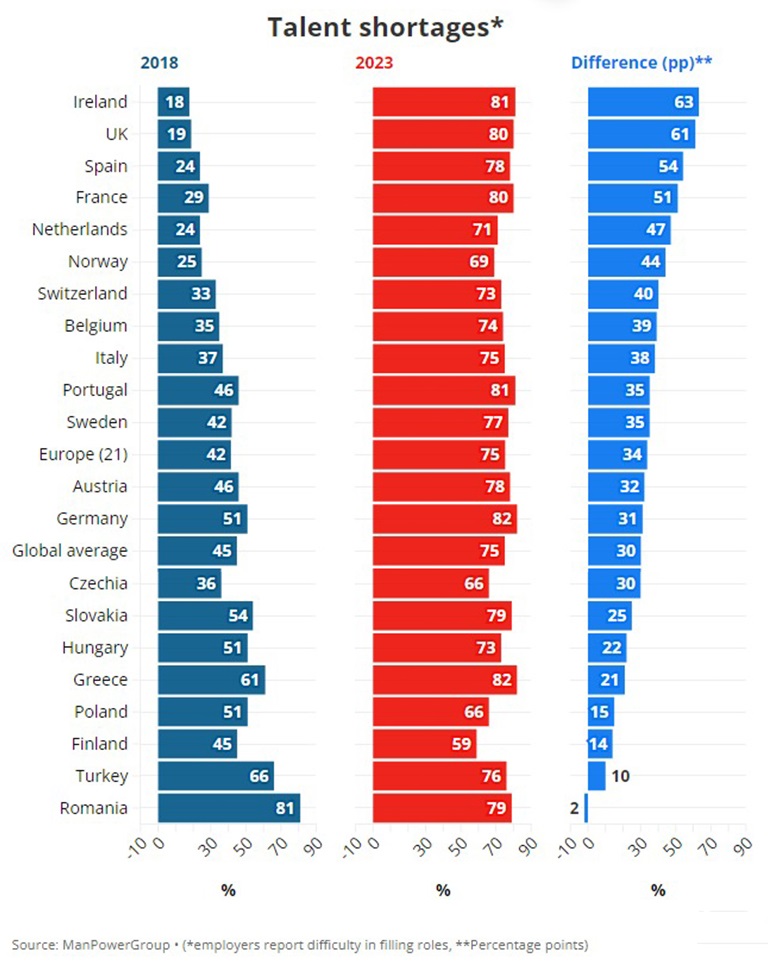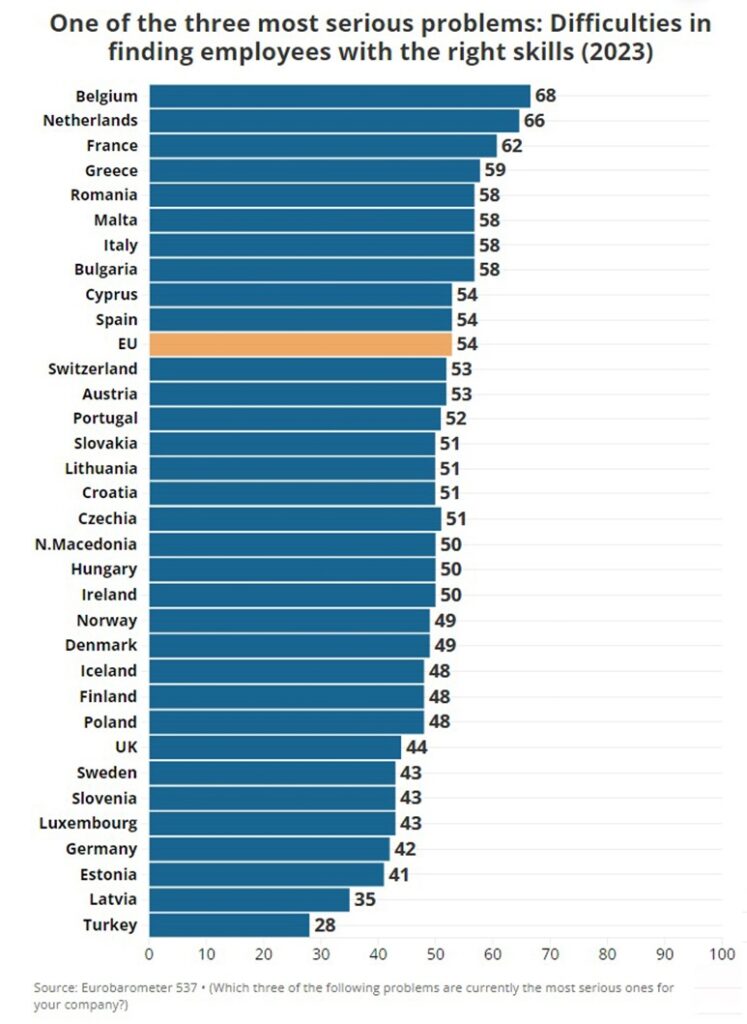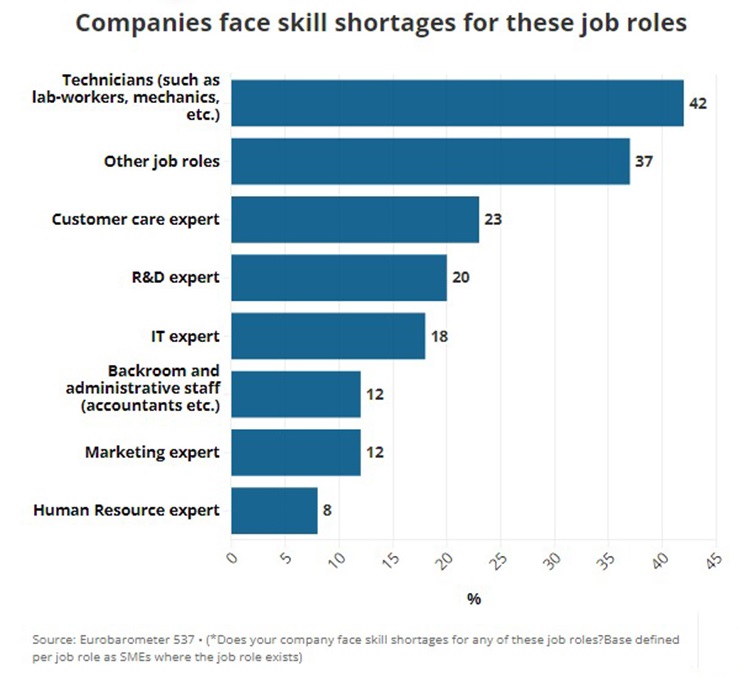
EU jobs crisis as employers say applicants don’t have the right skills –
Some 75% of employers in 21 European countries could not find workers equipped with the right skills in 2023.
The European Union is facing a jobs crisis due to employers stating that job applicants lack the necessary skills. Skill shortages have become a significant problem for employers throughout Europe, as indicated by various surveys. In 2023, 54% of Small and Medium-sized Enterprises (SMEs) in the EU reported that the challenge of finding employees with the right skills was one of their most serious issues, according to Eurostat.
ManpowerGroup, a global workforce solutions company, found that three out of four employers in 21 European countries currently lack the necessary skills, compared to 42% in 2018. This indicates a 79% increase in the past five years, equaling a 33%-point rise.
The survey, published in October 2023, revealed that talent shortage is a major global challenge. Mara Stefan, VP of Global Insights at ManpowerGroup, told Euronews Business, “The figures in our annual Talent Shortage survey have increased dramatically, indicating that the need for skilled workers is becoming increasingly acute.”
The shortage also affected European countries. Across 21 European countries, on average, 75% of employers had difficulty filling job roles, with rates ranging from 59% in Finland to 82% in Germany and Greece.
“In Europe, we are observing a decrease in unemployment, indicating a shortage of skilled workers to fill current or new job positions. Additionally, with an ageing population and a global decline in birthrates, the skills and talent gaps we are currently experiencing are further compounded,” she emphasized.
“This partly explains why Germany’s talent shortages are more severe than those of Finland. In 2023, Germany’s unemployment rate was 3.0%, while Finland’s was 7.0%, resulting in a smaller pool for finding skilled labor,” Mara Stefan added.

In 2018, the average was only 42% in these countries, ranging from 18% in Ireland to 81% in Romania. Apart from Romania, the proportion of employers unable to find the necessary skills increased significantly between 2018 and 2023.
Significant spike in Ireland, the UK, Spain and France
The percentage increase was substantial in several European countries. For instance, in Ireland, the UK, Spain, and France, the rise was over 50 percentage points. In Ireland, it jumped from 18% to 81%, and in the UK, it increased from 19% to 80%.
Moreover, the increase exceeded the European average in the Netherlands (47 pp), Norway (44 pp), Switzerland (40 pp), Belgium (39 pp), and Italy (38 pp).
European employers: Staff shortage is a serious problem
According to the Eurobarometer survey conducted in late 2023, 54% of small and medium-sized enterprises (SMEs) in the EU have reported challenges in finding employees with the necessary skills. They identified this as one of the top three most serious problems for their companies.

The percentage of skill shortage ranged from 28% in Turkey to 68% in Belgium. In 20 out of 34 countries, this figure was 50% or more, highlighting the widespread and significant nature of the issue.
Skill shortage was the most commonly identified serious problem for companies, with 34% citing regulatory obstacles or administrative burdens as the next most-identified issue.
Technicians needed most
In one-third of SMEs, there are technician roles, but many face a shortage of technically trained staff like lab workers and mechanics. Almost half (42%) of European SMEs reported not having enough technicians. This is the most common job role with skills shortages.
Additionally, 23% of SMEs with customer care experts reported skills shortages for positions such as sales professionals, client advisors, and receptionists.

Mains reasons behind the skills shortages
“According to a Eurobarometer survey, 56% of employers in the EU stated that they had few or no applicants as the main reason for their skill shortages. This percentage varied from 18% in Sweden to 73% in Belgium.
The Nordic countries all reported figures lower than the EU average in terms of identifying a lack of applicants, with Norway and Denmark being close to the average.”
In the ‘Big Four’ of the EU (Spain, France, Germany, and the UK), Spain, France, and Germany had slightly higher values than the EU average.
Employers mainly cited reasons such as applicants lacking the right qualifications, skills, or experience, followed closely by the lack of applicants at 54%. The percentage varied from 41% in France to 70% in Estonia, highlighting the widespread issue of skill shortages in the EU.
The UK had lower figures than the EU average for both indicators.
Why are staff and skill shortages increasing? Inter-linked challenges
The EU Commission has emphasized that there has been an increase in labor and skills shortages in all member states for almost a decade. These shortages are primarily driven by
- Demographic shifts.
- The demand for new skills linked to technological developments.
- Challenges related to working conditions.
“In 2023, the tight labor market is making it challenging for many to find individuals with the necessary soft and technical skills. It is crucial for businesses to invest in upskilling, reskilling, and preparing people for future jobs. According to Mara Stefan of ManpowerGroup, this should be a top priority for every business leader.”
The working-age population of the EU decreased from 269 million in 2012 to 264 million in 2021. The Brussels-based Business Europe’s “Analysis of Labour and Skills Shortages” report predicts a further decline of 35 million people by 2050. This report emphasizes that the challenges are interconnected.
Insufficient alignment of education and training curriculum with labor market needs contributes to shortages of skilled workers.
“The methodology of the Talent Shortage Survey was updated in 2022, transitioning from a phone-based approach to an online one. Though changes in methodology can affect results, Stefan noted that the most significant increase, from 45% to 69%, occurred prior to this adjustment.” Stefan added.
WHAT VINO CAN DO TO MAKE YOU QUALIFY
- We ensure that the jobs we select match each applicant’s skills, experience, and professional qualifications.
- We make sure our clients meet the qualifications required by their country of choice before submitting their work permit and visa application.







